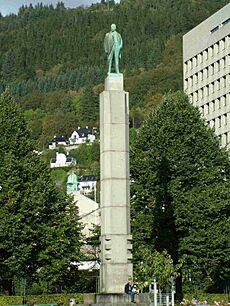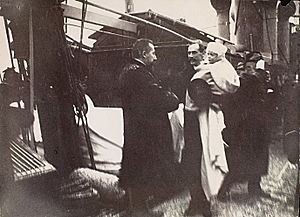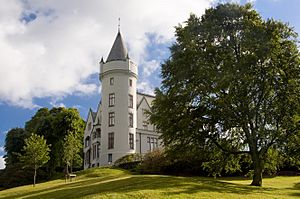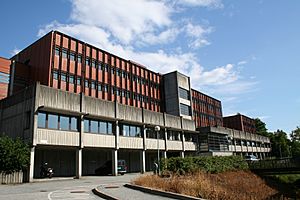Christian Michelsen facts for kids
Quick facts for kids
Christian Michelsen
|
|
|---|---|
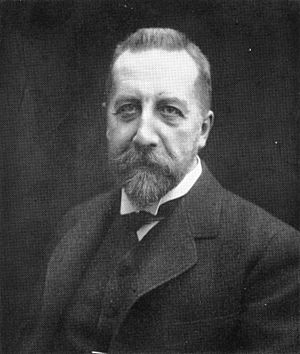 |
|
| Prime Minister of Norway | |
| In office 11 March 1905 – 23 October 1907 |
|
| Monarch | Haakon VII |
| Preceded by | Position established |
| Succeeded by | Jørgen Løvland |
| Personal details | |
| Born | 15 March 1857 Bergen, Norway |
| Died | 29 June 1925 (aged 68) Fana, Hordaland, Norway |
| Political party | Liberal Party (1884–1903) Coalition Party (1903–09) Free-minded Liberal Party (1909–25) |
| Other political affiliations |
Fatherland League (1925) |
Peter Christian Hersleb Kjerschow Michelsen (born March 15, 1857 – died June 29, 1925) was an important Norwegian businessman and politician. He was Norway's very first Prime Minister after it became fully independent. This was from 1905 to 1907. Michelsen is best known for his big role in Norway becoming separate from Sweden in 1905. He was one of Norway's most powerful politicians of his time.
Contents
Early Life and Career
Michelsen was born in Bergen, Norway. He was named after his grandfather, Bishop Peder Christian Hersleb Kjerschow. He was the oldest of five children in a merchant family.
He went to the Bergen Cathedral School. Later, he studied law at The Royal Frederick University in Oslo. After finishing his studies, he became a lawyer. He also started his own shipping company, Chr. Michelsen & Co. This company grew to be one of the largest in Norway.
Political Journey
Michelsen became a member of the Storting, which is the Norwegian Parliament, in 1891. He represented the Liberal Party. He often tried to work with different political groups. He wanted to create a big group of parties, from the Conservative Party to the Liberal Party. He called this the Coalition Party.
He served as the Finance Minister in a government led by Francis Hagerup. Michelsen strongly believed that Norway should be more firm with Sweden. In March 1905, Michelsen took over as Prime Minister. He quickly became the leader of the movement to end the union with Sweden.
Ending the Union with Sweden
The main reason for the union ending was that King Oscar II refused to approve new Norwegian laws about consuls. Consuls are officials who represent their country in other nations. The Swedish government believed that laws about foreign affairs should be part of the union agreement. This meant Norway needed Sweden's approval for such laws.
Sweden was willing to let Norway have its own consuls. But they insisted that the Foreign Minister for both countries must always be Swedish. Norwegians felt this showed Sweden was in charge. They did not want this unequal relationship to be official.
On May 27, 1905, King Oscar refused to sign the bill. Because of this, all the Norwegian government ministers, including Michelsen, resigned. The King did not do anything else. He probably knew that the union was about to end. Swedish politicians also did nothing, perhaps thinking Norway would back down again.
On June 7, the Norwegian Storting made a big announcement. They said that since the King could not form a new government in Norway after Michelsen resigned, he could no longer rule Norway. This meant he stopped being the King of Norway. This smart move gave the separation a legal reason. It was mostly Christian Michelsen's idea.
He knew that the Norwegian people were very united. This was thanks to months of clear information in the newspapers. In a vote to decide if Norway should stay in the union, only 184 people across the country voted to keep it. This was only one vote out of every 2,000 cast!
Michelsen believed Norway should be a republic, meaning a country without a king. However, he agreed that having a democratic monarchy (a king with limited power) would be better. This would make it easier for other countries to accept Norway's independence. It would also be accepted by most Norwegians. Prince Carl of Denmark became King Haakon VII of Norway. This happened after another vote where about 79% of people voted for a monarchy.
After the Union Dissolution
In 1906, Michelsen won an election. He ran on a platform of being "above-the-parties." This quickly made some leading Liberals disagree with him. In 1907, he resigned. He was tired of small arguments among political leaders. He also accepted that his political ideas had been defeated.
Jørgen Løvland continued Michelsen's work. But he could not keep the coalition united, and it broke apart in 1908. During Michelsen's time as Prime Minister, a new law was passed in 1906. This law helped local governments give money to unemployment funds. It introduced voluntary insurance for people who lost their jobs.
In 1925, Michelsen helped start the Fatherland League. He did this with the famous polar explorer Fridtjof Nansen and businessman Joakim Lehmkuhl.
Personal Life
In 1881, Christian Michelsen married Johanne Benedicte Wallendahl. She passed away in 1910. In 1905, he received a very high honor, the Grand Cross of The Royal Norwegian Order of St. Olav. In 1907, he received an even higher part of the award, the Collar.
Gamlehaugen Estate
In 1899, Michelsen started building a large house called Gamlehaugen. It was finished in 1900. Today, this estate is used as a home for the Norwegian Royal Family. It is also open to the public to visit.
Chr. Michelsen Institute
Michelsen left most of his money to a fund. This fund helped create and run the Chr. Michelsen Institute for Science and Intellectual Freedom. Today, the Chr. Michelsen Institute (CMI) is an independent research center. It focuses on international development and policy. It was founded in Bergen in 1930. CMI does research on topics like human rights, democracy, peace, and reducing poverty.
See also
 In Spanish: Christian Michelsen para niños
In Spanish: Christian Michelsen para niños
 | James Van Der Zee |
 | Alma Thomas |
 | Ellis Wilson |
 | Margaret Taylor-Burroughs |


